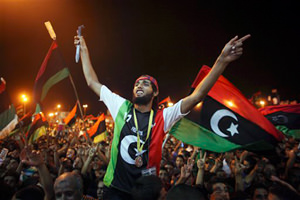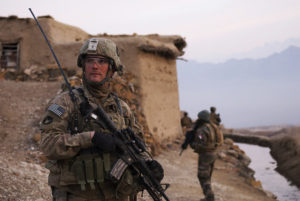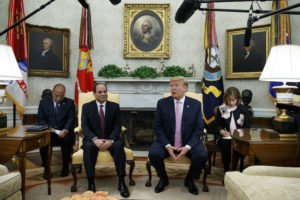Victory in Tripoli: They Did It
If the U.S. had gone seriously into the war, and behaved characteristically, Libya's revolution would not have succeeded this week.
The most significant and easily disregarded lesson of the successful Libyan uprising, as of the Egyptian and Tunisian risings that preceded it, is that the Arabs did it themselves. That is bad news for the United States.
The issue of “R2P,” so-called, has been current in American and European policy circles since the wars of Yugoslav succession found their genocidal climax in the killings at Srebrenica. Out of that came the proposition that democratic nations should accept the burden of a “responsibility to protect” vulnerable and endangered peoples, and even those being egregiously misgoverned. It assumed that Arab liberation comes from outside, not inside. It hasn’t happened that way.
Before this theory had been proposed formally, and long before the United Nations had favorably considered the argument that international society bears a responsibility to intervene in states abusing their own populations, as well as committing crimes against humanity, war crimes and ethnic cleansing, George W. Bush had cited exactly this duty as justification for his invasion of Iraq. The invasion supposedly would free Iraqis and spare Israelis, Western Europeans and Americans from the threat of weapons of mass destruction — which Iraq did not in fact possess. Rarely has so well intentioned a proposition been so devastatingly undermined.
The Libyans started by themselves, but were not alone very long. The revolt in Eastern Libya was counterattacked by the Libyan government’s armored forces, a turn of events that prompted the French government of Nicolas Sarkozy to military intervention — inviting the British government to join it, creating a joint European military command.
The British were unwilling to act without asking Washington’s permission, and the United States, since NATO’s inception, has considered it essential to block any independent European military initiative. Hence it insisted that NATO must command, and American officers hold leading positions.
But the American public, most American liberals as well as most Republican politicians, were hostile to “another war,” so American offensive action was called off. Qatar, the United Arab Emirates, Jordan, Morocco, and additional European governments were recruited to noncombat roles. The French and British did nearly all the air support, furnished arms, and sent in British SAS and French Special Forces personnel as trainers and tactical advisers.
The U.S. provided intelligence and carried out some special tasks, thus “leading from behind” as a Center for Strategic and International Studies expert in Washington has cautiously noted. Not all would agree with the Council on Foreign Relations analyst who said on Monday that this “was certainly a victory” for President Obama. The president accepted such plaudits from professionals and press, and declared: “American leadership is not simply a matter of going it alone and bearing all the burden ourselves. Real leadership creates the conditions and coalitions for others to step up as well.”
He failed to note that America’s absence was what enabled the victory. If the U.S. had gone seriously into the war, and behaved characteristically, Libya would have been heavily bombed to eliminate risks to American combatants, and U.S. ground troops would have been landed, provoking greatly increased resistance.
In Libya it would have been assumed, correctly, that the U.S., as in revolutionary Egypt, was seeking a more compliant Libyan leader, and wanted access to Libya’s oil and gas fields, and to what formerly was Wheelus U.S. Air Force Base. This already has been suggested (in U.S. military circles in Europe), as the possible headquarters for the U.S. Army’s Africa Command, which is still temporarily lodged in Europe, vainly searching for a country in Africa to take it in.
There is a dilemma in Middle Eastern matters, which every professional recognizes (and most nonprofessionals, for that matter), but which for domestic political reasons it is impossible for any administration to acknowledge. Washington’s total allegiance to Israel and to Israel’s expansion and domination of territories legally Palestinian renders impossible any close, impartial, disinterested or candid relationship with an Arab government.
Washington’s previous “alliances” or close relationships with Egypt and Tunisia, and its present relations with Yemen and Bahrain — the countries that have experienced the Arab “Awakening” of 2011, and those who at present continue to resist it — have always been constructed upon money, intimidation or blackmail. Washington will do whatever it can to manipulate the internal politics of the new governments that emerge in the region. It has no alternative.
The beauty and hope of the Arab Awakening movements has been that they have been spontaneous. That makes it impossible for the United States to deal with them impartially. The Europeans can and eventually will, which offers some mitigation of the situation, but at the cost of worsening American-European relations. American relations with new “post-Awakening” Arab governments will grow worse, assuming that these are more or less representative governments.
America is now more hated in Egypt (and in Afghanistan and Pakistan) than ever before. A Palestinian demand next month for full U.N. membership will undoubtedly worsen the situation, since Washington may be expected unconditionally to oppose this initiative. The outcome could be still more violence and hatred. The United States has — tragically — made itself the enemy of the Muslim world, and it is impossible to see how this can change, other than for the worse.
Visit William Pfaff’s website for more on his latest book, “The Irony of Manifest Destiny: The Tragedy of America’s Foreign Policy” (Walker & Co., $25), at www.williampfaff.com.
© 2011 Tribune Media Services, Inc.
Your support matters…Independent journalism is under threat and overshadowed by heavily funded mainstream media.
You can help level the playing field. Become a member.
Your tax-deductible contribution keeps us digging beneath the headlines to give you thought-provoking, investigative reporting and analysis that unearths what's really happening- without compromise.
Give today to support our courageous, independent journalists.






You need to be a supporter to comment.
There are currently no responses to this article.
Be the first to respond.